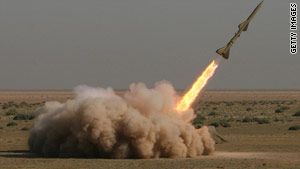BEIJING (AP) - State media heralded President Barack Obama's maiden trip to China as a triumph, but ordinary Chinese were largely shielded by their government from his most critical remarks and activists were disappointed by the measured tone of those they did hear.
One blogger even pined for the tough line taken by former President George W. Bush.
"Like a star rushing from one show to another, Obama has come and gone, without stirring the slightest ripples," blogger Zhao Dezhu wrote in an online post.
Zhao, who writes a popular blog and twitters under the name Hecaitou, said the visit made him miss Bush who "couldn't speak with flowery language and even made grammatical mistakes but spoke as plainly as an American farmer."
Obama, by contrast, speaks "with sweet but empty words."
State media portrayed the two-and-a-half day trip as a slam-dunk for China-U.S. relations, saying a joint statement issued by Obama and China's President Hu Jintao was a breakthrough to inspire the world.
"The Sino-U.S. Joint Statement is as worthy as gold," trumpeted the state-run 21st Century Business Herald while the Beijing Post said it set "a good example for many other bilateral relations."
Among regular folk, there was no such sizzle.
Maybe it was the rain in Shanghai or the below freezing temperatures in Beijing, but crowds did not line the streets to catch a glimpse of the president's motorcade—a marked difference from the well-wishers who have clamored to see Obama in Europe.
Obama does have a following in China, particularly among youth who see him as an exciting contrast to China's staid leadership, but his visit seems to have had little affect on even those who like him—possibly because many of his comments were not widely disseminated.
Several young people interviewed Wednesday said they admired Obama, but none had seen his town hall-style meeting in Shanghai and they based their opinions on photos, state media coverage, or things they'd read about him before. They had little to say about his visit specifically.
"He has a big fan club among the young people of China, because many of us have seen the adversity he has gone through and we look up to him for inspiration," Li Yuanyuan, a 24-year-old office worker said during her lunch break in downtown Beijing.
Han Xuanke, 29, an employee of a technology firm in Beijing's business district said he was more interested in Obama than he had been in Bush or former President Bill Clinton.
"He represents energy and something new and exciting that Chinese politicians don't have," Han said.
The town hall was intended to let the president mix with people like Han and Li, but Beijing ensured it was a tightly scripted affair that few people were able to see because it was only broadcast on one regional television channel.
Obama's strongest comments during the town hall were directed at China's Internet controls.
"I'm a big supporter of non-censorship," Obama said. "I recognize that different countries have different traditions. I can tell you that in the United States, the fact that we have free Internet—or unrestricted Internet access—is a source of strength, and I think should be encouraged."
The critical remarks were played down in the Chinese media and scrubbed from some Chinese Web sites.
The event was streamed live on the White House Web site, but the connection was choppy and delayed. The State Department said later more than 7,000 Chinese Internet users watched the event—a tiny fraction of the more than 300 million Chinese who are online.
Chinese bloggers who saw it were grateful that he addressed censorship, but many zeroed in on what they considered Obama's waffling language.
"Learn English from Obama: Instead of saying 'I want to eat,' say 'I am a big supporter of non-hunger,'" Wang Pei, a writer based in eastern China's Hangzhou, twittered on Tuesday.
Many were watching the town hall closely for how Obama would handle China's poor human rights record, especially after Secretary of State Hillary Clinton said in February that the United States would not let such concerns interfere with cooperation with Beijing on global crises.
Obama spoke broadly about basic freedoms but steered clear of the buzz phrase "human rights." The next day, he more pointedly raised the issue during a media appearance with President Hu, even touching on rights for minorities—a particular sore spot in China, where Tibetans and Muslim Uighurs seek more autonomy.
"We do not believe these principles are unique to America, but rather they are universal rights and that they should be available to all peoples, to all ethnic and religious minorities," Obama said.
Xue Chen, a research fellow of Strategic Studies at the Shanghai Institutes for International Studies, said Obama's measured tone on such sensitive topics was a positive development that showed a rethinking of U.S. foreign policy since Bush.
"They are now more willing to take the role of a listener. And only in this way can the U.S. interests be better met," he said.
For many mainland activists, however, the approach fell short.
Yang Zili, a Chinese dissident recently freed after eight years in prison for forming a political study group, had been expecting something stronger from Obama.
"Although Obama mentioned some words such as 'rights' and 'freedom' in the speech in Shanghai, we expect he can do more to promote the improvement of China's human rights condition," he said.
Zhang Jian, a 30-year-old office worker from north China's Inner Mongolia region said many Chinese were taking a wait-and-see approach to the new leader.
"It's a trip Obama needs to make. ... But I don't think we're necessarily going to immediately warm up to the U.S. as a result of one trip," said Zhang who was visiting Beijing on business. "It will be a relationship built over mutual trust and understanding over time."
___
Associated Press writer Chi-Chi Zhang and researcher Xi Yue contributed to this report.






